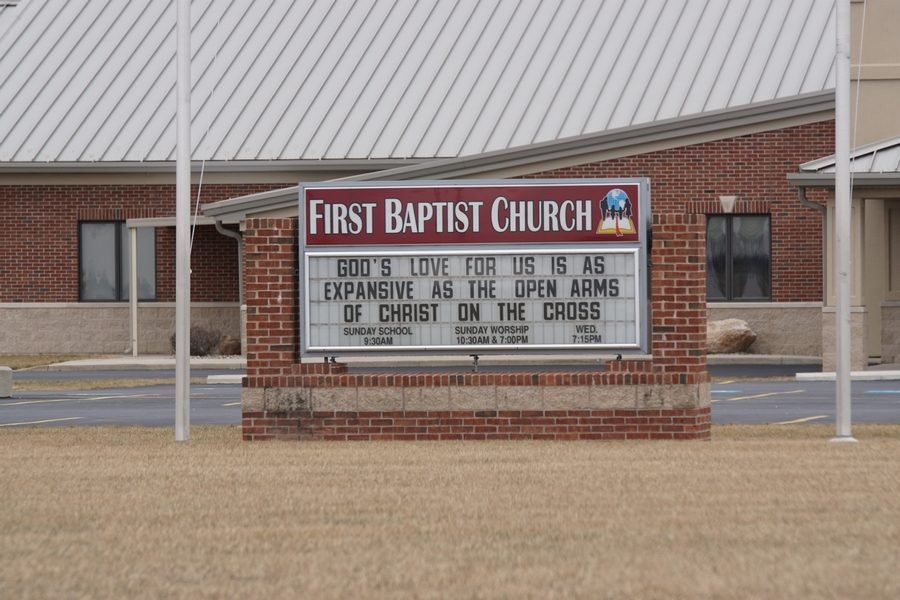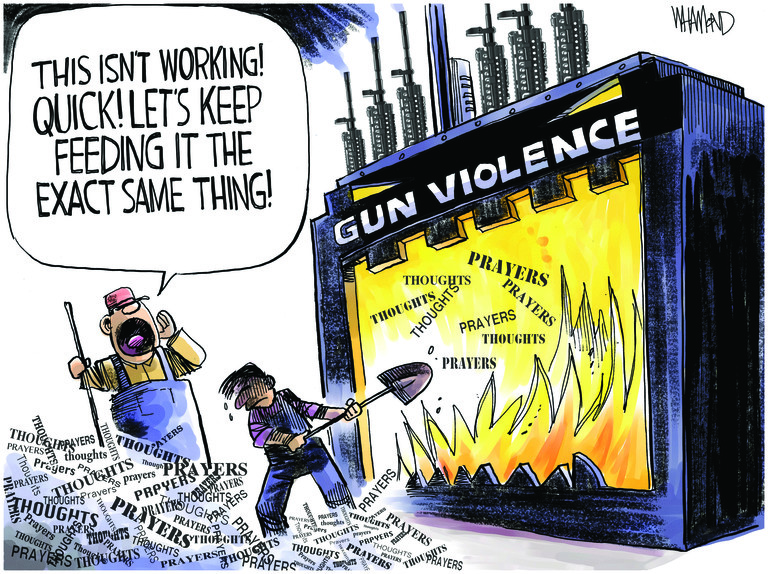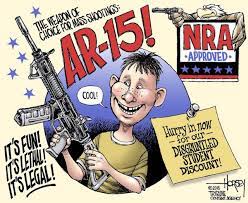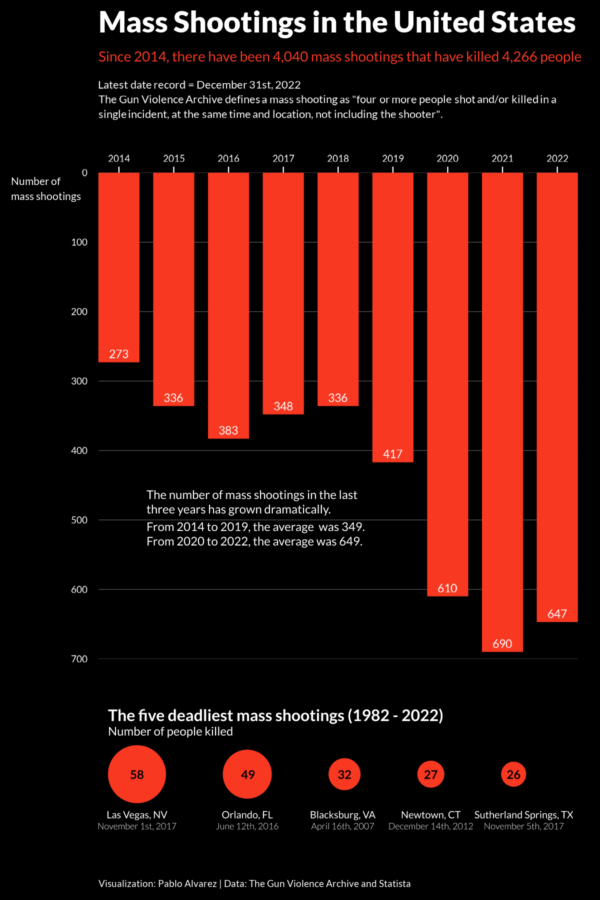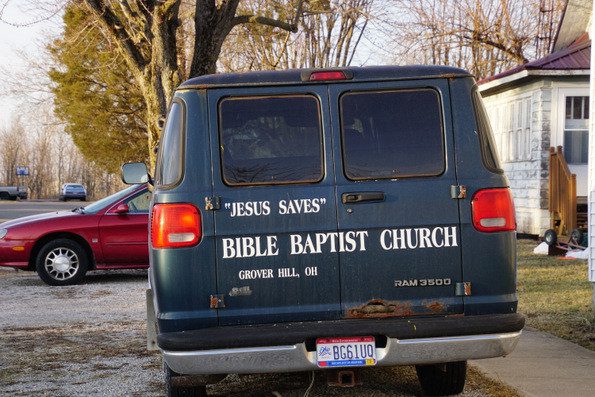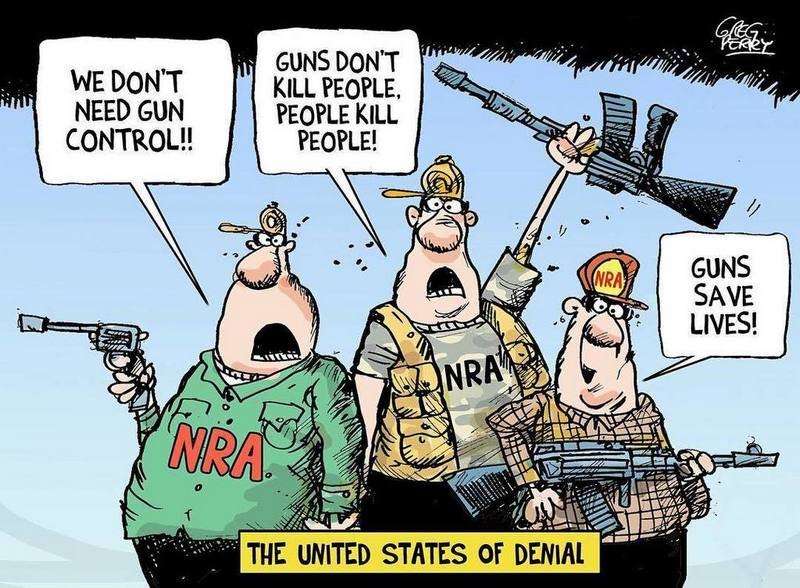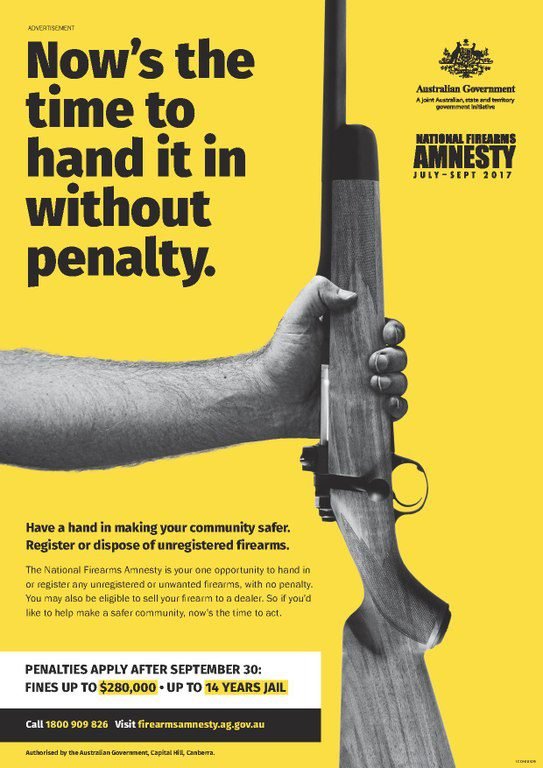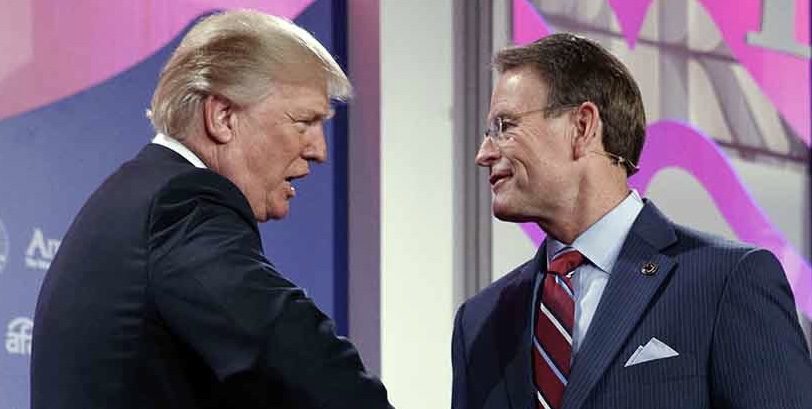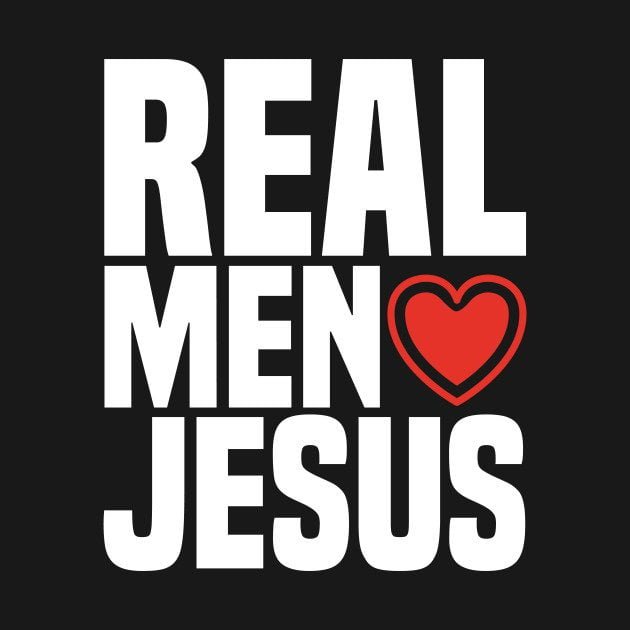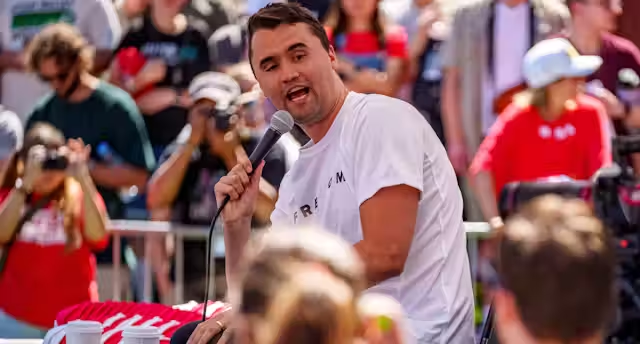
By Abby Zimet, Common Dreams, Used with Permission
The fiery shards from the murder of Charlie Kirk still ricochet in baleful ways, even as his shooter’s views and motives remain murky. Despite rabid calls by a regime eager for revenge to extinguish leftist “scum” who rendered their bigot hero “a martyr for truth and freedom,” the killer seems to be a muddled mix of gun freak, devout gamer, and violent nihilist. In his bloody wake, many now beset by irrational vitriol are left to argue, “I don’t support what happened to Charlie, but Charlie supported what happened to Charlie.”
Political violence is, of course, as old as America: Federalists vs. anti-Federalists, indigenous genocide, slavery, lynching, war, Lincoln, the 1960s’ white and black assassinations, civil, women’s and gay rights struggles, Jan. 6 riots, police state troops, racist ICE raids and, in a country with perhaps 500 million guns, an estimated 125 Americans killed daily with guns – a rate 26 times higher than any other developed nation – and up to 800 children killed in school shootings impacting over 360,000 students. In 2023, the most recent year with full data, nearly 47,000 people died in gun violence. The first six months of this year saw an almost 40% surge in gun-related acts of terrorism and targeted violence over last year, with over 520 reported plots or acts of violence and, to date, 300 mass shootings, forty-seven at schools. In a nation awash in killing machines, an increasingly right-wing GOP, and a mood of rage-fueled paranoia and polarization, each act of political violence makes the next more likely.
Charlie Kirk, 31, was shot and killed by an assassin’s bullet in the neck while speaking under a tent that read “Prove Me Wrong” on the campus of Utah Valley University on the first of a 15-stop “America Comeback Tour” by his right-wing Turning Point USA; he was struck just as he responded to a question about mass shootings by blaming gangs. It was the day before a historically freighted Sept. 11 symbolizing myriad acts of or against violence: It was the day when Gandhi launched the first nonviolent resistance in South Africa in 1906 to stunning political effect; when Chile’s democratically elected Socialist President Salvador Allende was assassinated; when Al Qaeda attacked the World Trade Center and Americans came together with such inspiring grace and strength the event came to represent “the ultimate failure of terrorism against the United States” – until a pernicious Bush Administration launched two bloody, pointless, illegal wars, which still haunt us, in its name.
Kirk was a vibrant, hateful, genial, incendiary mouthpiece for a MAGA worldview of bigotry and intolerance, a “loathsome human being (who) celebrated violence against people he didn’t like” and used his mocking, performative “debates” with students to effectively spread misinformation, inflame young, impressionable, vaguely discontent people, surreptitiously urge democracy be replaced by an emergent Christian Fascism, and make millions. “The language has been violent. The discord has been great,” wrote Rev. Graylan Scott Hagler. “There has been a consistent invitation to dine at the table of heated racist discussion posing as legitimate political speech,” in which Kirk “rhetorically violated” the safety of Blacks, Muslims, queers, immigrants, and multiple ‘others’ in the name of a defaming, divisive “free speech.” “He (did) not care about the security of others. He did not show empathy,” said Hagler. “Charlie Kirk expanded hatred (and) marketed the vile speech of old racisms in new wineskins.”
Kirk claimed America was full of “prowling Blacks” who target white people “for fun.” He said “God’s perfect law” says gay people should be stoned to death, Black people were better off during Jim Crow, Democrats “stand for everything God hates,” the Civil Rights Act was a mistake, Islam is “the sword the left is using to slit the throat of America.” He put liberal academics on watch lists to be targeted and harassed, called Dems “maggots, vermin and swine,” mocked the death of George Floyd, “joked” a “patriot” should bail out Paul Pelosi’s attacker, urged “a Nuremberg-style trial for every gender-affirming doctor,” charged prominent Black women like Michelle Obama “don’t have the brain power” to succeed unless they “steal a white person’s slot.” A fierce critic of gun control, he argued we cannot allow mass shooting victims to “emotionally hijack the narrative,” and championed as “prudent” and “rational” the cost of gun deaths in exchange for having “the 2nd Amendment to protect our other God-given rights.”
Like much of the right, he practiced “eliminationist rhetoric,” wherein political opponents aren’t just wrong but evil, less than human. Still, when the 2nd Amendment came for Charlie Kirk, thoughtful opponents wrestled in a deeply human way with the complexities. “He was a vile human being,” said one, “but I do not want to live in a society where vile human beings are assassinated.” Again and again, people echoed that pivotal duality: “We can condemn political violence and Kirk’s murder while also condemning Kirk for the hate he fomented,” “Murder is bad, and sometimes bad people are murdered,” “Kirk said and did many despicable things, but he did not deserve to die,” “Kirk should not have been shot and killed for his beliefs, and nobody else” – Minnesota lawmaker Melissa Hortman and her husband, whose deaths Trump still refuses to acknowledge, no pol, no child – “should be either.” This was not vengeance-tinged schadenfreude, he said; it was a moral and political reckoning with America’s dissonant reality.
The right, obviously, ignored those subtleties, unable to recognize any space between “endorsing over-the-top grief for white men who espouse violence” and not endorsing that violence. Here, as usual, appeasement is in vain. “They are going to claim we (left/liberals/Democrats/non-white non-supremacists) said whatever is most convenient for them to say we said, no matter what we say,” wrote Rebecca Solnit. “They’ve already decided all of us were the shooter.” And they did. Within minutes, with zero information on the killer, Trump, elected on a platform of fomenting online rage against the “other,” seized the deadly moment to foment more. He raved against “a radical left group of lunatics” – “we just have to beat the hell out of them” – “the agitator,” “the scum,” who for years “have compared wonderful Americans like Charlie to Nazis…This kind of rhetoric is directly responsible for the terrorism that we’re seeing in our country.” Elizabeth Warren, asked if Dems should “tone down” their rhetoric: “Oh, please.”
After he ordered the nation’s flags flown at half-mast – never once done for the hundreds of schoolchildren gunned down over the years – fellow brownshirts picked up the vengeful tiki torch and feverishly ran with it. Musk: “The Left is the party of murder…Our choice is to fight or die.” Libs of Tik Tok: “THIS IS WAR.” Matt Walsh: “We are up against demonic forces from the pit of Hell.” Seethed Paulina Luna, “EVERY DAMN ONE OF YOU WHO CALLED US FASCISTS DID THIS,” charging, “You were busy doping up kids, cutting off their genitals, inciting racial violence…YOU ARE THE HATE you claim to fight.” Logically, they also vowed to use the power of the state to exact retribution against Dem pols, “libtard” pundits, anyone who may have viewed Kirk as anything but a flawless hero and martyr. Clay Higgins urged social media posts be banned, business licenses revoked, students or teachers be kicked out, non-citizens be banished: “Cancel with extreme prejudice these evil, sick animals.”
As usual, a spewing, psychotic Stephen Miller won the talking-evil-bullshit-out-of-your-Nazi-ass award, raving about “a wicked ideology” that “hates everything that is good, righteous and beautiful and celebrates everything that is warped, twisted and depraved,” an ideology that views “the perfect family with bitter rage while embracing the serial criminal with tender warmth” as its adherents “tear down and destroy every mark of grace and beauty while lifting up everything monstrous and foul.” Say what the fuck? In a posthumous Kirk podcast in the White House hosted by J.D. Vance – who flew Kirk’s body home in Air Force Two and pledged to “go after” fictional leftist NGOs, including The Nation, that “foments violence” – a smitten Miller decried those “cheering the evil assassination that cruelly robbed this nation of one of its greatest men” and vowed to use his “righteous anger,” “as God is my witness,” to “use every resource” to destroy the left’s “vast domestic terror movement…in Charlie’s name.”
Experts say the first, vital violence the authoritarian right commits is against fact, truth, history, meaning, language – reality itself. And so, again, it comes to pass. There has been no “cheering” of an act everyone knows with “horror” will spiral into chaos and repression. Though Miller said his last message from Kirk “before he joined his creator in heaven” was “we have to dismantle radical left organizations…fomenting violence,” there is no such organization; nor is there a leftist “vast domestic terror movement.” But there is, well-documented, on the right. See here, here, and here: Far-right plots and attacks have “significantly outpaced terrorism by other types of perpetrators” since 1994, and 2024 was the third year in a row that all extremist-related killings in the U.S. were carried out by right-wingers.” A study by the DOJ itself likewise found, “The number of far-right attacks continues to outpace all other types of terrorism.” It was just scrubbed from its website.
But who needs facts? Not a desperate, unhinged right that increasingly views everyone else as an existential threat to the white, straight, Christian nationalist oligarchy they seek to create. And now, notes Chris Hedges, they have their martyr, “the lifeblood of violent movements”- albeit “a reprehensible human being and Christo-fascist who enacted his agenda by preying on weak-minded people” – often critical to “turn the moral order upside down” en route to “full-scale social disintegration.” Inevitably, he predicts, the right’s newfound, giddy, sanctimonious “intoxication with violence will feed on itself like a firestorm.” In less than a week, it already is, with dozens of people across the country facing retribution – hounded, fired, threatened, arrested – in a GOP-sanctified ”witch-hunt” against anyone who dares to not mourn Kirk, or accurately, scathingly quote him, or decline “to be sad that a guy willing to sacrifice school children for the Second Amendment wound up getting shot at a school.”
MSNBC fired political analyst Matthew Dowd for musing, “Hateful thoughts lead to hateful words, which lead to hateful actions.” The Washington Post fired Karen Attiah, their sole Black columnist, for noting Kirk’s racist history, especially toward Black women. Dem Rep. Seth Moulton was flooded with threats – “Cute kids – be a shame if they didn’t have a father” – for arguing Trump should make it clear political differences can’t and shouldn’t be solved by violence. And in what Thaddeus Howze calls “deafening hypocrisy,” a populace who long (if selectively) quoted Scripture to make their pious points has abruptly banished their “live by the sword” tenet after “the gun culture (Kirk) championed did not exempt him.” “Here was a man who minimized other people’s agony, suddenly forced to taste the violence he once dismissed,” he writes. As a result, his “2nd Amendment justice” is neither celebration nor solution; it’s simply the fact that, “The logic he defended and normalized folded back on him.”
Enter Tyler Robinson, who on Tuesday appeared by video in court to be charged with aggravated murder and six other counts; prosecutors will seek the death penalty. After Kash Patel’s error-ridden, “amateur hour” clown show of an FBI search, Robinson was ultimately convinced by his father and a family friend to turn himself in. Described as a quiet, “squeaky clean” kid, he came from a Trump-voting, gun-loving family; his father was a sheriff turned evangelical pastor, online, his mother often posted (now-deleted) photos of Tyler and his brother grinning with guns, and they’d gifted him the rifle he killed Kirk with. Early reports suggested he was part of Nick Fuentes’ “Groypers,” a white-nationalist group from the “toxic underbelly of the MAGA ecosystem” who use Internet memes, underground cultural references, and racist dog whistles to covertly spread hate, and who’d publicly harassed Kirk as not extremist or “pro-white” enough. Now, it’s only clear that Tyler was “a guy who plainly had Internet brain poisoning.”
As “experts” struggled to decipher reported markings on the killer’s ammunition – “Hey fascist, catch!” with a sequence of arrows, etc – gamers quickly identified them as symbols from Helldivers 2, in which elite forces battle against aliens on behalf of a fascist state. Meanwhile, more facts emerged: Tyler, his politics shifting left, was in a romantic relationship with a roommate transitioning from male to female, and he’d told them and his father he killed Kirk because he “had enough of his hatred.” All told, his views were so hazy he could be deemed a “nihilist violent extremist” (NVE), often alienated young men, desensitized to violence by gaming and right-wing subcultures, who lack a coherent political belief system but feel an inchoate rage – a reminder to a partisan world, wrote Ken Klippenstein, “of the actual diversity of the nation, and the cost of polarization that demonizes the other side.” The lack of “tidy narrative,” said Rep.Sean Casten, suggested this was merely the tale of “a young man who made a bad choice with a gun.”
Online, some declared MAGA’s civil war had been cancelled “due to shooter being demographically uncooperative.” But the regime, fired up, had no interest in leading us out of “this ugly toxic pit.” Ignoring facts, law, nuance, and their ostensible mission to unite, they’ve used the shooting to launch “the biggest assault on the First Amendment in our country’s modern history.” Pam Bondi, appearing on Goebbels’ wife Katie Miller’s malignant podcast, vowed the Justice Department would “go after” those engaging in “hate speech,” or “violent rhetoric designed to silence others from voicing conservative ideals,” aka accurately quoting Charlie Kirk. “There’s free speech and there’s hate speech,” she said. “We will absolutely target you.” Heather Lyle on the “staggering irony” of selectively outraged, right-wing grievance politics “collapsing under the weight of its own contradictions…A movement that insists mass death is acceptable collateral in the name of liberty also demands national mourning when its own suffers.”
Trump, meanwhile, has helped stifle free speech by threatening an ABC News reporter who asked about it – “We’ll probably go after people like you. You treat me unfairly – you have hate in your heart” – an Australian reporter – “You are hurting Australia right now. Your leader is coming to see me soon, I’m going to tell him about you…Quiet” – and “the degenerate” New York Times with a bizarre, “hilarious,” $15 billion libel lawsuit packed with lies, boasts and juvenile praise for his “transcendent ability to defy wrongful conventions” and “greatest personal and political achievement in American history” despite a pernicious paper that “has engaged (in) decades-long lying about your Favorite President (ME!).” Like any eight-year-old sociopath, he has a notably short attention span: Asked how he’s doing after losing his “friend” Kirk, he said, “Very good. And by the way, right there, you see the trucks just started construction of the new Ballroom…It’s going to be a beauty…one of the best in the world, actually. Thank you very much.”
Elsewhere, everyone spoke of Kirk and the havoc his death had wrought. “Pay attention,” urged Sen. Chris Murphy of moves to crush dissent: “Something dark may be coming.” A somber Bernie warned of political violence that “threatens to hollow out our public life”; many followers, citing the “paradox of intolerance,” argued tolerance is a social contract the right has already ravaged: “Charlie Kirk is a self-inflicted gunshot statistic. Kirk’s widow Erika, 36, a glossy former Miss Arizona with a “Christian clothing company” and “devotional blessings” podcast, gave an ”address to the nation” at a lectern reading, “May Charlie be received into the merciful arms of Jesus, our loving savior”; she told “evil-doers” they have “no idea what you have unleashed,” and vowed the tour, mission and “wisdom” of Charlie, “wearing the glorious crown of a martyr,” “will endure.” At a shabby Kennedy Center vigil – bad music, red caps, USA chants, shrieking pastors – regime fans and officials proclaimed, “We are all Charlie Kirk now.”
Not quite. “Grief is not a performance,” offered a therapist to those struggling to respond. “When a public figure dies, you are not obligated to manufacture sorrow (to) honor a life (that) caused harm.” “You are inheriting a country where politics feels like rage,” Utah Gov. Spencer Cox told traumatized students. “Words are not violence. Violence is violence.” After the arrest, Cox said he’d been praying the shooter “wouldn’t be one of us” – a queer immigrant would be better? – “so I could say, ‘We don’t do that here.‘” But of course he was, and we do. “What the actual hell have we become?” asked Catholic writer Emily Zanotti. From another, “We have met the enemy, and he is us.” White, male, home-grown, needy, beset by an inchoate animus and fury now wretchedly reflected in a regime whose leaders choose to use power only for hate. Compare and contrast with, say, Stephen Colbert, who this week spoke of love, loss, and “desperately loving” a country now unrecognizable. Even Tyler Robinson decried hate, and, to his partner, voiced love.
The same day he shot Charlie Kirk, the “uniquely American cycle” was reprised one state over when a male student opened fire at a Colorado high school, wounding two before killing himself; so much blood was already flowing it barely made the news. Two days later, also under-reported, a police SWAT team arrested a 13-year-old boy near Seattle for “unlawful firearms possession.” Evidently fixated on school shootings, the boy had amassed an arsenal of 23 guns with accompanying ammunition, including tactical style rifles mounted on the walls of his room, handguns strewn through the house and, in a backpack beneath a turtle habitat, AR assault magazines; police also found drawings of school shooters and social media posts that said, “When I turn 21 I am going to kill people” and, “It’s over! My time is almost hear!” (sic). In an interview, his mother, who home-schooled him, said the posts were an attempt by her son to “be cool,” and he had no intention of harming anyone.
Bruce Gerencser, 68, lives in rural Northwest Ohio with his wife of 47 years. He and his wife have six grown children and sixteen grandchildren. Bruce pastored Evangelical churches for twenty-five years in Ohio, Texas, and Michigan. Bruce left the ministry in 2005, and in 2008 he left Christianity. Bruce is now a humanist and an atheist.
Your comments are welcome and appreciated. All first-time comments are moderated. Please read the commenting rules before commenting.
You can email Bruce via the Contact Form.

